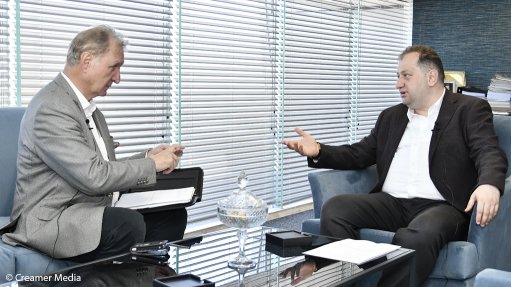
Menar MD Vuslat Bayoğlu (right) being interviewed by Mining Weekly Online's Martin Creamer
Photo by: Creamer Media's Dylan Slater
JOHANNESBURG (miningweekly.com) – Resources holding company Menar has reiterated its national-interest-serving coal offer to troubled State-owned power utility Eskom, which last week warned that its record R20-billion loss of 2018/19 would be repeated in 2019/20.
Eskom’s debt was more than R454-billion at the end of September and interest payments are expected to balloon in the current financial year to R38-billion, making them the utility’s second-largest cost item after coal procurement, which is expected to be R55-billion.
“Eskom needs the right quality coal at the right price,” Menar MD Vuslat Bayoğlu told Mining Weekly Online. (Also watch attached Creamer Media video.)
“Our priority is to offer Eskom everything that we have. The coal that we’re mining is this country’s mineral and it has to first serve this country’s interests, then it can go to export markets,” said Bayoğlu, who calculated that his group would be able to offer Eskom about 20-million tonnes of coal a year from 2021/22 from its portfolio of coal projects.
“Obviously, Eskom’s success is very close to our hearts and minds because if Eskom’s in trouble, the country’s in trouble,” he added.
Eskom is taking steps to commission its modern new Medupi and Kusile power stations fully, retire old power stations that have reached the end of their economic lives, and plan the way forward.
“Renewables are going to add a lot of value to the power market, especially solar and wind, and maybe some gas options,” said Bayoğlu.
But going forward, the utility would concurrently be in significant need of right-priced and right-quality coal for an extended period of time.
Menar is intent on playing its part to ensure this and Bayoğlu believes other coal-mining companies will "come to the party" as well.
New Eskom CEO Andre de Ruyter, who worked for coal-to-liquids company Sasol for more than 20 years, starts on January 15 in an example-setting way by taking office at a salary below that of the current compensation package.
“I think the new CEO is going to have very busy days when he starts in January and we wish him good luck because we want him to be successful,” said Bayoğlu, who is prepared to transact with Eskom on an open-book, fixed-price basis or whatever is most suitable for the utility.
Currently, Eskom has three kinds of coal-purchasing arrangements. These are cost-plus contracts, which generally endure for the life of a mine or the life of a power station; fixed-price contracts, which are also long term; and spot-price contracts, which are shorter in duration.
Critics argue that Eskom’s current coal-pricing models need to be reviewed to render them more transparent and less reliant on personal negotiation, to avoid different prices being paid for the same product.
A coal indexing solution has been suggested, but the challenge with indexing is the high level of liquidity required.
Bayoğlu expressed the view that Eskom would likely require a unique model, which could conceivably be arrived at in consultation with the industry.